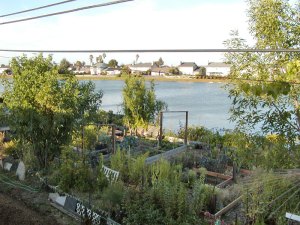Living the Green way
Share
Practicing the 10 Key Values at San Mateo Ecovillage
By Sanda Everette, Green Party of California
 When I am not talking, emailing, or meeting about the Green Party, and not at my job as a teacher, a large part of my life focuses on living at the San Mateo Ecovillage, which my husband and I founded. We live with more than a dozen other people who share our green values, though only some are actually registered Green. We call ourselves a mini-ecovillage.
When I am not talking, emailing, or meeting about the Green Party, and not at my job as a teacher, a large part of my life focuses on living at the San Mateo Ecovillage, which my husband and I founded. We live with more than a dozen other people who share our green values, though only some are actually registered Green. We call ourselves a mini-ecovillage.
The San Mateo Ecovillage is in an urban setting located 20 miles south of San Francisco overlooking a large lagoon. It is an intentional community with a mission and established charter. Apartment homes in our community are based on shared ownership or ìtenants in commonî as a way for the housing in this high-priced area to be affordable.

A definition of ecovillage from the Global Ecovillage Network website states: ìEcovillages are urban or rural communities of people that strive to integrate a supportive social environment with a low-impact way of life. To achieve this, they integrate various aspects of ecological de sign, permaculture, ecological building, green production, alternative energy, community building practices, and much more.î
ìEcovillages, by endeavoring for lifestyles which are successfully continuable into the indefinite future, are living models of sustainability and examples of how action can be taken immediately. They represent an effective, accessible way to combat the degradation of our social, ecological and spiritual environments. They show us how we can move toward sustainability in the 21st century.î
The San Mateo Ecovillage has been set up to grow some of its own food and to be a model to teach others ways they can also do it. We have studied a variety of sustainable gardening techniques over the years including permaculture, biodynamic, and biointensive agriculture. We completed an extended urban permaculture course, have been certified as permaculture designers, and endeavor to apply its ecological design principles. We have even had some specialized training in mycology including: the use of mushrooms in the garden, in soil remediation, and building the soil food web as taught by Dr. Elaine Ingham.
We have extensive organic gardens in raised beds made with mostly recycled wood and stone. We have planted about two dozen fruit trees as well as berries, veggies, and herbs, often saving our own seeds.† We are master composters and make extensive use of compost and other soil building methods including: vermicomposting (worm bins), thermal composting, brewing and using compost tea, and raising chickens which aid in the composting process.
We have also planted dense combinations of plants that help each other while improving the soil. Efforts are made to never leave the soil bare and use cover crops, mulching often. Even some weeds build tilth in the soil, bring up minerals, and feed the organisms that make other plants grow better. Now the ecovillage has a great soil structure that is two to four feet deep. Our latest project is building a gray water system with ponds surrounded by cob benches as part of the permaculture principle to keep water on your land as long as possible.
By being active participants in the food system, our food-buying dollars are our vote for or against food production methods. Sustainability rests on the principle we must meet the needs of the present without compromising the ability of future generations to meet their own needs. By participating at this level with sustainable agriculture the ecovillage is integrating the Green Partyís 10 key values including ecological wisdom, decentralization, community-based economics, social justice, responsibility, and future focus.
In addition to gardening there are other related green values in the community. When building or remodeling, we have focused on reused or recycled materials or products produced in a more sustainable way, like bamboo flooring or blue jean insulation. Members are personally committed to reducing their impact on the environment: Reduce, reuse, recycleÖ in that order.† Generally we avoid buying food and other items that contribute to the destruction of local economies and the environmentófair trade, not free trade.
At the ecovillage we talk politics, share videos on progressive subjects such as American Blackout, and have even hosted several Green candidates. Those living here who are not registered Green are ìdecline to stateî with leanings ranging from Socialist to Green to an occasional Democrat. Other than primaries, most vote Green, most of the time.
For information: www.greensolutions.org/smcc.htm




